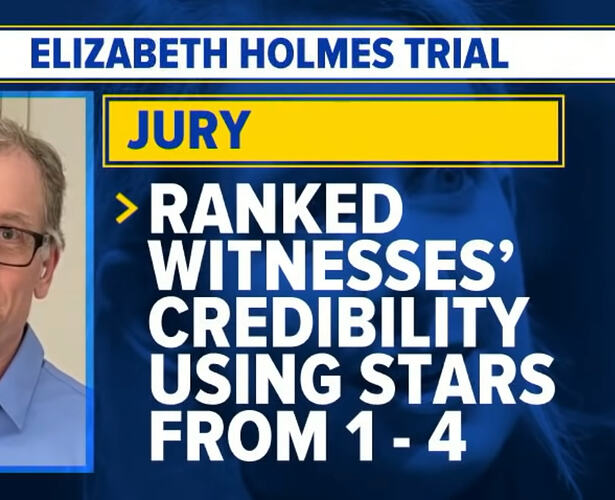Examples of people doing CF-type or CF-contradicting things.
Jurors from Elizabeth Holmes trial break silence after guilty verdicts l GMA - YouTube
The jury explicitly used weighted factors not decisive judgments (and they got it wrong, only finding her guilty of financial stuff not medical malpractice stuff. she’s going to get a much lighter sentence than she should. there were multiple reasons for getting it wrong and epistemology is one).
From Academic Epistemology - #34 by Max (I expected a special cross-reference link to show up here when I linked to this thread, but it didn’t so I’ll quote what I wrote here)
Lots in here about the lack of Paths Forward in the world.
This is a bunch of combining weighted factors from different dimensions. (These factors might all be assigned equal weights. I haven’t looked at the details.)
I was actually interested in what seafood to get or not get, but it’s hard to find useful information. There are a bunch of biased blog post kinda things, many of which are from people who sell seafood. Some have a content farm vibe. None that I saw had much detail or good explanations. Then I looked at this Monterey Bay Aquarium info (they’re aggressive/trendy environmentalists, which mixes together some good points and some bad points) and it’s a lot like college rankings and other refuted stuff Multi-Factor Decision Making Math
Multiple comments advise practicing, and treating some actions like skills to work on, even though they could seem simple/easy and not necessary to practice (hence “I know it sounds stupid”). E.g.
Practice saying these things. I know it sounds stupid, but you need to get used to saying them. If you have a friend or family member who can help, practice with them doing the thing he does.
- Please don’t touch me
- Please leave me alone
- Let go of my hand
- You’re too close to me (while leaning or stepping back)
Silicon Valley Bank failed recently. It’s a big deal that’s in the news. The basic reason they failed is they bet big on interest rates staying low. They got invested in long duration stuff with low interest rates (but higher interest rates than short duration stuff). Then interest rates went up and they were locked in to the low interest rates.
https://www.bloomberg.com/opinion/articles/2023-03-14/svb-took-the-wrong-risks
“in late 2020, the firm’s asset-liability committee received an internal recommendation to buy shorter-term bonds as more deposits flowed in,” to reduce its duration risk, but that would have reduced earnings, and so “executives balked” and “continued to plow cash into higher-yielding assets.” They took imprudent duration risk, ignored objections, and it blew them up.
So they went out of biz b/c executives refused to listen to advice and instead did higher risk thing with more short term profits.
one way to view this is it wouldn’t happen at a company with internal paths forward b/c then reducing this risk would have won the debate
the lack of effective, productive debate – and instead having authoritarian decision making – is the problem. (Plus problematic short term incentives for execs are a widespread and well known problem in ~every industry. Which itself is related to the lack of paths forward or other productive debate methods in politics, so people know about the problem and have various conflicting ideas about it and those conflicts of ideas do not get resolved. We get years of bickering without solutions or conclusions.)
From The Sunlit Man by Brandon Sanderson (my bold):
“When I was first given a spear,” he said, “I didn’t know how to hold it. I didn’t even know how to stand. Each time I sparred, I had to dedicate all my thoughts to standing correctly. The more I did it, the more natural that stance became. It’s like…I didn’t just learn the lesson, I internalized it. That left my conscious mind free to think about something else. Since my body now stood properly on its own, I could wonder about how I held the spear.
“Then that grip became natural, so I could focus on thrusting with precision. I could learn to change my grip, resetting my stance so that I was oriented toward the enemy. Each of these things slowly became instinct. Through deliberate practice—to learn that specific thing. And each time, once internalized, that left my mind free to try something else. […]”
Most people do superficial, local-optima style problem solving instead of focusing on root causes. It’s a recurring problem that this home inspector sees:
Neither the mold remediation nor the sealing the inside basement walls addressed the root cause at all.
Similarly, doctors also commonly treat symptoms not causes. Some of that is actually counter-productive, because some symptoms of illness (e.g. fever) are our bodies’ own defense mechanisms, not something the illness itself causes.
Doing fixes for non-root-issues also can hide problems and remove visibility from problems so they can get worse.
Related to not overreaching:
Because context is so helpful to figure out the meaning of new words that you encounter, most people would benefit from watching lower level videos than what they think they should. If you are losing track of what’s being said, then we advise you to try watching easier content. In this case, challenging yourself with harder content is counter-productive most of the time.
Disclaimer: I have a lot more to learn about CF and consider myself a beginner.
This guitar learning resource emphasises aspects of learning methods that I believe CF also emphasises. In some cases it uses the same terminology as CF (e.g ‘bottleneck’). The emphasis on the philosophy of learning is rare amongst music related resources I’ve encountered.
Some examples:
Prioritising prerequisites and bottlenecks:
The biggest bottleneck to your progress will always be how well you know the notes on the fretboard.
I think it’s so important that (if you don’t have a lot of time and want to get good) I would prioritise learning the notes on the fretboard over everything else.
Mental bandwidth is the idea that you only have so much attention to spread across different things you need to focus on while you are playing the guitar.
You might have needed 100% of your attention to play your chords clearly. But as you start strumming you realise that you have to shift 80% of your attention to your right hand. You needed 100% for chords, but now they are only left with 20%! It makes sense that they are not going to sound as good.
As you get better at each thing, both will require less attention. You’ll get to the point where you only need 50% of your attention for each thing.
Practising requiring metrics of success and failure:
When you’re learning the guitar, it’s important to remember that your objectives change as you begin to practice different things. If you’re judging your performance based on what success looks like in one area, when it requires a different metric of success, you can easily get discouraged. Even if you’re actually making excellent progress!
Whenever you try to learn something new in music, ask yourself, what is the context of this information?
If you learn something and it doesn’t have a context, it’s not helpful information.
I think the causal evidence is very suggestive, but hardly conclusive.
The counterarguments are weak
These are examples of thinking in terms of indecisive arguments.
For context: Bill Evans is one the great jazz pianists of the 20th century and played on the most significant jazz album of all time: Kind of Blue by Miles Davis. In this 1966 documentary Bill talks about ‘the creative process and self-teaching’, and a lot of what he says seems to agree with CF. Interestingly the interviewer is Bill’s brother, and a less accomplished pianist.
Disclaimer: I am a beginner at CF.
Some themes I see that agree with CF:
- criticism of people incorrectly approaching learning an advanced skill
- instead, approach learning advanced skills by learning basic, understandable, accurate, ‘elementary’, sub skills
- doing things too hard for you or approximating them in a ‘vague’ way will mean you can’t built on them and will lead to confusion (getting stuck)
- free up conscious space for learning more advanced skills by automatising sub skills.
All the quotes are transcribed by me from audio and there may be some mistakes.
@ 11:42:
I see this in a lot of people that come to me for advice.[…]That they tend to approximate the product, rather than attacking it in a realistic, true way, at any elementary level - regardless of how elementary - but it must be entirely true, and entirely real, and entirely accurate. They would rather approximate the entire problem than to take a small part of it an be real and true about it. And I think this is a very important thing: that you must be satisfied, to be very clear and to be very real and to be very analytical at any level. You can’t take the whole thing. And to approximate the whole thing in a vague way gives one a feeling that they’ve probably more or less touched the thing but in this way you just lead yourself toward confusion.
I think here Bill is saying that these people want to do advanced things and their incorrect approach is to try to approximate the advanced things, rather than seeing the advanced things as being built from smaller, understandable, elementary parts, and approaching those. And that the approach of trying to approximate advanced things vaguely just leads towards confusion.
@ 12:35:
It is true of any subject that the person that succeeds in anything has the realistic view point at the beginning and knowing that the problem is large and that he has to take it a step at a time and he has to enjoy the step by step learning procedure.
He says here that this learning procedure is general and is true of any subject. He also says that one has to enjoy the learning procedure.
@ 15:00:
It is better to do something simple which is real… it can still be satisfactory but it’s something you can build on because you know what you’re doing… Whereas if you try to approximate something which is very advanced and don’t know what you’re doing, you can’t advance, you can’t build on it.
Do simple things you can succeed at because you can actually build on those.
@ 15:47:
You could be too cautious to the point where you never discover anything. I think you need to have a certain adventurous spirit. But…over a long period of time, you need be really aware of what is accurate, and what is not. And when you’re adventurous you need to know when you succeed and when you don’t succeed.
You need to be able to judge success and failure to learn.
Now the whole process of learning the facility of being able to play jazz is to take these problems from the outer level in, one by one, and to stay with it at a very intense conscious concentration level until that process becomes secondary and subconscious. Now when that becomes subconscious then you can begin concentrating on that next problem which will allow you to do a little bit more and so on and so on.
Automatisation. Freeing up conscious mental capacity for further problem solving.
That’s great! I knew people often focused on advanced stuff but didn’t want to work on the building blocks. But I hadn’t had that specific thought that they prefer approximating the advanced thing over getting the building block right. I was thinking of them as trying to get the advanced thing right but failing.
I saw some of the psychological issues involved, like that they may want to work on impressive stuff not beginner stuff, and they may lack confidence in succeeding by any long series of steps that requires diligence over time. But it makes sense that part of the issue is also that they may underestimate the downsides of approximation.
I liked all the other Evans quotes too.
Awesome, I’m glad this was of some value! I obviously don’t understand CF enough to have seen that this had new ideas in it, but I guess I do understand it enough to recognise some of its principles in what Evans was saying.
Another relevant quote from the same video nearer the end:
“Most people just don’t realize the immensity of the problem and either because they can’t conquer [it] immediately they think they haven’t got the ability, or they’re so impatient to conquer it that they never do see it through. But if you do understand the problem, then I think you can enjoy your whole trip through.”
I like the emphasis on understanding the immensity of the problem, and how that relates to enjoying the process of solving it.
Also for anyone reading those Evans quotes I’d recommend listening to Evans actually speaking them in the video, because I think the way he says them helps them make more sense than my transcriptions do.
This is an example of the consequences of not having Paths Forward or any other rational mechanisms for intellectual issues to get debated and reach conclusions. Lots of people just ignore ideas/problems/criticism and there’s no real organized opposition from a group of people (like a community of rational scientists or intellectuals) and there’s also no real opposition from common knowledge and popular opinion. I think the use of lead paint and leaded gasoline are also examples.
Interview with particularly impressive Mario 64 speedrunner, GreenSuigi (with debatably the best performance of any speedrunner for any game).
Some notable things about how he approaches games:
- He practices significantly more than most players.
- He does a lower amount of higher quality attempts at actual speedruns where he’s trying to get a good time.
- He wants to understand in full, exact detail how tricks work and why they fail. He’s unsatisfied if anything is going wrong that he doesn’t understand what the issue is and how to fix it. He’ll talk with people who understand the game’s code and memory addresses and stuff to figure out details.
- He limit tests by trying very fast strategies and trying to find the best ways to do levels. Then he tries to make it consistent, and will use easier strategies if necessary to get consistency.
- He’s very goal oriented with his practice, including consistently getting specific results for sub-goals like sub-sections of levels.
A lot of speedrunners use overly inconsistent strategies, do thousands of attempts, don’t fully understand why things only work part of the time, and do a lot of resets because they keep screwing up and trying again so they end up playing the beginning of the game too much and as regular gameplay not dedicated, intentional practice. GreenSuigi doesn’t do that. He spends more of his time focused on learning and powering up, not on achieving results. Then when he does try to achieve results, it’s much faster and more efficient.
Transcript from 5:17 to 5:24:
I’m basically not afraid to just like
ball out in the beginning and like fail
a lot just to figure out what the best
way to do every individual star is
I take “ball out in the beginning” to mean he does lots of exploration and tests out many different ideas to find the best strategy. Which is like brainstorming and then criticizing until you have a winner.
Doing more exploration means less results in the beginning, but better results in the end.
In an older interview, GreenSuigi says he’ll often practice until he can do a level 3, 5 or 10 times in a row successfully. He wants to get enough consistency that it feels pretty easy, not like a hard, unreliable strategy, before trying to do it in speedruns. He did previously mention SBLJs as an exception which are too hard to get really consistent at (backwards long jumps using stairs are only used in very short runs, not in any longer runs).
He says a big way he’s different than other players is focusing better during practice. He really tries to play his best during practice. He finds going for streaks (like 5 successes in a row) helps with that.
Earlier he said he doesn’t get burned out from practice but doing actual runs will tire him out if he does a lot. He didn’t really explain why but I have a guess: it may be because runs require constant focus for longer periods of time. With practice, you can focus and try hard but you also get good opportunities for breaks much more frequently, like approximately every minute (after you finish a level). Runs can take over an hour without breaks depending on the category. So with practice, you can take a 15 second break or 5min break pretty much whenever you feel like it, and with runs you can’t.
He says he tends to play a few hours a day, and 75% of his playtime is practice not runs. If he doesn’t feel like it, he doesn’t play. This is less total time than a lot of other top runners, and also is notably less than the 40-hour work week. Like 3h daily, without skipping weekends since he actually wants to play, would be 21h/week not 40, and no commute or extra burdens (e.g. getting dressed in work clothes and preparing a lunch in advance or having to go out to eat since your kitchen isn’t available). A little later he said he does 3-5h a lot of days, which still even at the top end could be 35h in his most intense week, whereas a lot of ppl have 40h of work as the typical lower bound and do more sometimes for intense weeks.
His favorite YouTuber is https://www.youtube.com/@BobbyBroccoli (I’ve enjoyed some of those vids). He doesn’t watch a lot of YouTube anymore because he thinks it’s mostly a waste of time; when he does watch, he tends to watch long form content.
He’s very very goal focused and doesn’t like moving on to other goals without finishing his current goal.
My bolds:
These common law systems are legal systems that give great weight to judicial precedent
More recent decisions, and decisions of higher courts or legislatures carry more weight than earlier cases and those of lower courts.
While Common law systems place great weight on precedent, [90] civil law judges tend to give less weight to judicial precedent.
Common law systems tend to give more weight to separation of powers between the judicial branch and the executive branch.
The concept of “weight” (of ideas, evidence, arguments) is integrated throughout our legal system, but it’s fundamentally epistemologically broken.
Science has similar issues.




